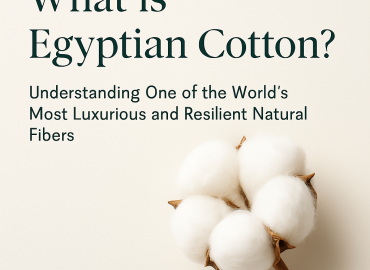What Is Egyptian Cotton?
Understanding One of the World’s Most Luxurious and Resilient Natural Fibers
When it comes to high-end home textiles, luxury linens, and durable premium fabrics, few materials are as universally recognized—or as universally admired—as Egyptian cotton. Known for its unmatched softness, strength, and breathability, Egyptian cotton has earned its reputation as a global benchmark for textile excellence.
But what truly sets Egyptian cotton apart from other cotton types? And why is it so valued by manufacturers, retailers, and consumers alike? In this article, we explore the origin, characteristics, and advantages of Egyptian cotton—and how Nur Nil incorporates it into sustainable, high-performance textile solutions for clients around the world.
The Origins of Egyptian Cotton
Egyptian cotton refers to long-staple and extra-long-staple (ELS) cotton fibers cultivated in Egypt’s fertile Nile River Delta. These climatic and geographic conditions—warm sun, rich soil, and year-round irrigation—produce fibers that are longer, finer, and stronger than conventional cotton.
The cotton plant grown in Egypt is primarily Gossypium barbadense, a species known for its silky fiber texture and superior durability. Though cotton has been cultivated in Egypt since ancient times, modern Egyptian cotton came into prominence in the 19th century and remains a globally protected designation today.
What Makes Egyptian Cotton Different?
Egyptian cotton is distinguished by its fiber length, referred to as “staple.” The longer the fiber, the higher the quality of the cotton. Compared to standard cotton, Egyptian cotton has:
Longer Staple Fibers: ELS cotton fibers range from 1 3/8 to 2 inches, allowing them to be spun into finer, smoother yarns.
Stronger Threads: The extra length and purity reduce the number of exposed fiber ends, resulting in fabrics that are stronger, less prone to pilling, and more durable.
Natural Luster: Egyptian cotton has a beautiful, natural sheen that enhances fabric aesthetics without requiring synthetic finishes.
Exceptional Breathability: The structure of the fiber allows air to pass easily, making the fabric cool, absorbent, and ideal for hot climates.
Superior Softness: Due to fewer fiber splices in the yarn, the fabric feels incredibly smooth and gentle on the skin.
Why Egyptian Cotton Matters in Today’s Textile Market
In a market increasingly defined by performance, sustainability, and longevity, Egyptian cotton stands out as a fiber that offers all three.
Sustainability & Low Environmental Impact
Egyptian cotton is typically hand-picked, a method that is gentler on the plant and produces purer, less contaminated fibers. This allows for reduced energy input during processing and less chemical treatment in the finishing stages.
Additionally, as a natural fiber, Egyptian cotton is biodegradable and aligns with circular material sourcing strategies, such as those promoted by OEKO-TEX®, GOTS, and other sustainability frameworks.
Longevity = Less Waste
Because Egyptian cotton is naturally stronger and more durable, products made from it last longer, retain their appearance better, and reduce the need for frequent replacement—supporting a more responsible consumption model.
Consumer Trust & Global Recognition
The term “Egyptian cotton” carries brand equity. It is a mark of quality that resonates with hotel groups, luxury retail brands, and consumers who prioritize comfort, health, and durability.
How Egyptian Cotton Is Used at Nur Nil
At Nur Nil, we incorporate Egyptian cotton into our high-end home textiles and hospitality lines, particularly in:
Premium towels with high GSM (grams per square meter), combining softness and superior absorbency
Jacquard-woven hotel linens with long-lasting strength and elegant finishes
Custom-branded luxury bedding for retail and private label clients
Spa and wellness products where breathability and natural purity are essential
We partner directly with certified Egyptian cotton suppliers and test every batch for staple length, purity, and contamination, ensuring our clients receive authentic, high-grade material with traceable origins.
Certifications and Authenticity: What to Look For
The value of Egyptian cotton has led to mislabeling in the global market. To ensure transparency, look for certifications and supplier traceability systems such as:
Cotton Egypt Association (CEA) – the official body responsible for protecting the Egyptian cotton trademark
OEKO-TEX® STANDARD 100 – ensures the final product is free from harmful substances
GOTS (Global Organic Textile Standard) – verifies organic farming practices and environmental management
BSCI, SMETA, and ICS – ensure ethical labor practices during cultivation and processing
At Nur Nil, we align our Egyptian cotton sourcing with all of the above standards, helping clients meet both regulatory and brand-level sustainability goals.
Why Global Buyers Choose Nur Nil for Egyptian Cotton Products
Vertically Integrated Manufacturing – From yarn to packaging, everything is handled in-house under strict quality control
Custom Development – Tailored GSMs, colors, patterns, and branding options
Fast Lead Times – Thanks to our strategic location in Egypt, we offer shorter delivery windows to Europe and the U.S.
Duty-Free Access – Through trade agreements such as QIZ (for the U.S.) and EU-Egypt Association Agreement, clients benefit from tariff-free import on Egyptian cotton goods
Ready to Work With Egyptian Cotton?
Whether you are sourcing for a hotel chain, a luxury home brand, or a sustainable retailer, Egyptian cotton offers a timeless combination of integrity, performance, and elegance.
At Nur Nil, we ensure that this iconic fiber is handled with the care it deserves—from field to finish.


